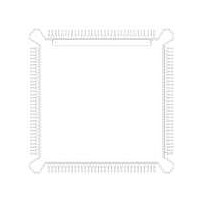MC68HC16Z1CEH16 Freescale Semiconductor, MC68HC16Z1CEH16 Datasheet - Page 252

MC68HC16Z1CEH16
Manufacturer Part Number
MC68HC16Z1CEH16
Description
IC MCU 16BIT 16MHZ 132-PQFP
Manufacturer
Freescale Semiconductor
Series
HC16r
Specifications of MC68HC16Z1CEH16
Core Processor
CPU16
Core Size
16-Bit
Speed
16MHz
Connectivity
EBI/EMI, SCI, SPI
Peripherals
POR, PWM, WDT
Number Of I /o
16
Program Memory Type
ROMless
Ram Size
1K x 8
Voltage - Supply (vcc/vdd)
2.7 V ~ 5.5 V
Data Converters
A/D 8x10b
Oscillator Type
Internal
Operating Temperature
-40°C ~ 85°C
Package / Case
132-QFP
Processor Series
HC16Z
Core
CPU16
Data Bus Width
16 bit
Controller Family/series
68HC16
No. Of I/o's
26
Ram Memory Size
1KB
Cpu Speed
16MHz
No. Of Timers
2
Embedded Interface Type
QSPI, SCI
Rohs Compliant
Yes
Package
132PQFP
Family Name
HC16
Maximum Speed
16 MHz
Operating Supply Voltage
3.3|5 V
Number Of Programmable I/os
16
On-chip Adc
8-chx10-bit
Number Of Timers
11
Data Ram Size
1 KB
Interface Type
SCI, SPI, UART
Maximum Clock Frequency
16 MHz
Maximum Operating Temperature
+ 85 C
Mounting Style
SMD/SMT
Minimum Operating Temperature
- 40 C
Lead Free Status / RoHS Status
Lead free / RoHS Compliant
Eeprom Size
-
Program Memory Size
-
Lead Free Status / Rohs Status
Lead free / RoHS Compliant
Available stocks
Company
Part Number
Manufacturer
Quantity
Price
Company:
Part Number:
MC68HC16Z1CEH16
Manufacturer:
Freescale Semiconductor
Quantity:
10 000
Part Number:
MC68HC16Z1CEH16
Manufacturer:
FREESCALE
Quantity:
20 000
- Current page: 252 of 500
- Download datasheet (6Mb)
10.3.8 Write Collision
10.3.9 Mode Fault
10-12
A write collision occurs if an attempt is made to write the SPDR while a transfer is in
progress. Since the SPDR is not double buffered in the transmit direction, a successful
write to SPDR would cause data to be written directly into the SPI shift register. Be-
cause this would corrupt any transfer in progress, a write collision error is generated
instead. The transfer continues undisturbed, the data that caused the error is not writ-
ten to the shifter, and the WCOL bit in SPSR is set. No SPI interrupt is generated.
A write collision is normally a slave error because a slave has no control over when a
master initiates a transfer. Since a master is in control of the transfer, software can
avoid a write collision error generated by the master. The SPI logic can, however, de-
tect a write collision in a master as well as in a slave.
What constitutes a transfer in progress depends on the SPI configuration. For a mas-
ter, a transfer starts when data is written to the SPDR and ends when SPIF is set. For
a slave, the beginning and ending points of a transfer depend on the value of CPHA.
When CPHA = 0, the transfer begins when SS is asserted and ends when it is negated.
When CPHA = 1, a transfer begins at the edge of the first SCK cycle and ends when
SPIF is set. Refer to
mation on transfer periods and on avoiding write collision errors.
When a write collision occurs, the WCOL bit in the SPSR is set. To clear WCOL, read
the SPSR while WCOL is set, and then either read the SPDR (either before or after
SPIF is set) or write the SPDR after SPIF is set. (Writing the SPDR before SPIF is set
results in a second write collision error.) This process clears SPIF as well as WCOL.
When the SPI system is configured as a master and the SS input line is asserted, a
mode fault error occurs, and the MODF bit in the SPSR is set. Only an SPI master can
experience a mode fault error, caused when a second SPI device becomes a master
and selects this device as if it were a slave.
To avoid latchup caused by contention between two pin drivers, the MCU does the fol-
lowing when it detects a mode fault error:
After correcting the problems that led to the mode fault, clear MODF by reading the
SPSR while MODF is set and then writing to the SPCR. Control bits SPE and MSTR
may be restored to their original set state during this clearing sequence or after the
MODF bit has been cleared. Hardware does not allow the user to set the SPE and
MSTR bits while MODF is a logic one except during the proper clearing sequence.
1. Forces the MSTR control bit to zero to reconfigure the SPI as a slave.
2. Forces the SPE control bit to zero to disable the SPI system.
3. Sets the MODF status flag and generates an SPI interrupt if SPIE = 1.
4. Clears the appropriate bits in the MDDR to configure all SPI pins except the SS
pin as inputs.
MULTICHANNEL COMMUNICATION INTERFACE
Freescale Semiconductor, Inc.
10.3.4 SPI Clock Phase and Polarity Controls
For More Information On This Product,
Go to: www.freescale.com
M68HC16 Z SERIES
USER’S MANUAL
for more infor-
Related parts for MC68HC16Z1CEH16
Image
Part Number
Description
Manufacturer
Datasheet
Request
R
Part Number:
Description:
Manufacturer:
Freescale Semiconductor, Inc
Datasheet:
Part Number:
Description:
Manufacturer:
Freescale Semiconductor, Inc
Datasheet:
Part Number:
Description:
Manufacturer:
Freescale Semiconductor, Inc
Datasheet:
Part Number:
Description:
Manufacturer:
Freescale Semiconductor, Inc
Datasheet:
Part Number:
Description:
Manufacturer:
Freescale Semiconductor, Inc
Datasheet:
Part Number:
Description:
Manufacturer:
Freescale Semiconductor, Inc
Datasheet:
Part Number:
Description:
Manufacturer:
Freescale Semiconductor, Inc
Datasheet:
Part Number:
Description:
Manufacturer:
Freescale Semiconductor, Inc
Datasheet:
Part Number:
Description:
Manufacturer:
Freescale Semiconductor, Inc
Datasheet:
Part Number:
Description:
Manufacturer:
Freescale Semiconductor, Inc
Datasheet:
Part Number:
Description:
Manufacturer:
Freescale Semiconductor, Inc
Datasheet:
Part Number:
Description:
Manufacturer:
Freescale Semiconductor, Inc
Datasheet:
Part Number:
Description:
Manufacturer:
Freescale Semiconductor, Inc
Datasheet:
Part Number:
Description:
Manufacturer:
Freescale Semiconductor, Inc
Datasheet:
Part Number:
Description:
Manufacturer:
Freescale Semiconductor, Inc
Datasheet:











